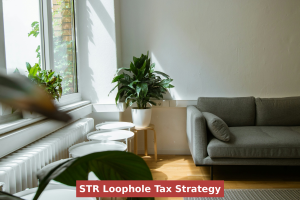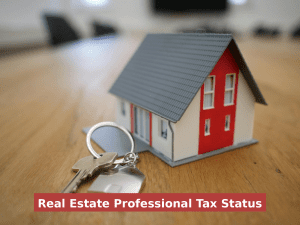How Short-Term Rentals with the power of depreciation can save small business owners an average of $9,400 in taxes
Table of Contents
What is a short-term rental?
A short–term rental refers to a rental of any residential home unit or accessory building for a short period of time. This generally includes stays of less than a month (30 days), but the maximum length can vary depending on the state and jurisdiction in which the rental is located.
When managing short-term rentals, property owners often confront a variety of legal and financial decisions. Two critical aspects to consider are.
- The structuring of ownership through Limited Liability Companies (LLCs) for liability
- The strategic use of depreciation to enhance tax
Managing Short-Term Rentals Through LLCs
An LLC can serve as a vital tool for property owners, particularly in the realm of short- term rentals. By holding rental property through an LLC, owners can separate their personal assets from their business operations, significantly reducing personal risk. If a legal issue arises from the rental property, such as a tenant’s injury claim or contractual disputes, the LLC structure generally limits liability to the assets within the LLC, protecting the owner’s personal assets (e.g., personal savings, home) from lawsuits or business debts.
- Operating through an LLC can also project a more professional image, which can be beneficial in dealings with tenants and service
- An LLC can streamline business operations, allowing for easier management of finances, taxes, and
- Setting up and maintaining an LLC involves some administrative costs, including registration fees and potential annual fees depending on state
- Owners must ensure that they adhere to all legal formalities required to maintain the LLC’s status, such as keeping business and personal finances
The Short-Term Rental Loophole
Here’s the exciting part: there are ways to make your rental property an “active business” in the IRS’s eyes. This allows you to deduct losses from your regular income, potentially saving you thousands in taxes.
There are a few ways to achieve this “active business” status with short-term rentals:
- Keeping it Under 7 Days: If you rent your property for seven days or less at a time, the IRS considers it an active business. This opens the door to offsetting your W-2 income, self-employment income, and more with rental losses.
- Offering More Than Just Space (30 Days or Less): You can extend your rentals to 30 days or less, but you’ll need to provide significant personal services. Think daily cleaning, meal prep, or concierge-like services.
- Providing Extraordinary Services: This option allows for any rental duration, but the services you offer need to be truly exceptional. Think private chefs, unique experiences, or highly customized services.
- Other Options to Consider: The IRS offers a few other ways to qualify your rental property as an active business, but these are less common. We’ll focus on the above methods for now.
Power of Depreciation
Depreciation allows you to deduct a portion of your property’s value each year due to wear and tear. There are two main ways to calculate depreciation:
- Traditional Method: Spreads the deduction evenly over a set period (around 27.5 years).
- Cost Segregation Study: This accelerates your depreciation deductions by identifying and depreciating specific components of your property (appliances, flooring, etc.) faster than the whole building.
Strategic Benefits:
- By reducing taxable income, depreciation can increase net cash flow from rental operations, providing more liquidity for owners to reinvest in the business or for personal
- Depreciation can be a critical element in long-term financial strategies, particularly in planning for renovations, expansions, or
Considerations:
- It’s important to note that when a rental property is sold, the IRS may recapture some of the depreciation claimed over the years, taxing it as ordinary income. Thus, it’s crucial to plan for potential tax impacts upon the sale of a depreciated
Please note that applying A Section 1031 like-kind exchange strategy can defer capital gains taxes and depreciation recapture on the sale of rental properties, so business owners can invest more money to buy more rental properties instead of paying taxes.
The IRS distinguishes between capital improvements and Capital improvements (e.g., adding a new roof, new windows, or an extension) can be depreciated, whereas repairs (e.g., painting, fixing leaks) are typically deducted in the year they are made.
Summary
For owners of short-term rental properties, utilizing an LLC can offer significant protection from personal liability and enhance business operations. Meanwhile, leveraging depreciation allows property owners to reduce taxable income, which can lead to improved cash flows and tax savings.
How short-term rentals are taxed?

- Business short-term rentals with material participation: This type involves active involvement from the property owner, which could qualify the income as non-passive and subject to different tax treatment.
- Business short-term rentals without material participation: In this case, the owner does not actively participate, which typically makes the income
- Passive short-term rentals with material participation
- Passive short-term rentals without material participation
Next, all four of these classifications depend on the following three (3) factors. They will directly impact how your short-term rentals are taxed.

Key Factors Affecting Taxation
- The taxation can differ based on whether the average stay is less than or more than 7 days. Rentals with average stays of less than 7 days are not subjected to self-employment tax and could qualify for ordinary loss treatment if material participation is shown.
- Providing substantial services (like those found in hotels such as daily cleaning, meals, or concierge services) can change the nature of the income to active business income, which is reported on Schedule C and subject to self-employment
- If the property owner can demonstrate material participation in the rental activity, losses from the property can be treated as ordinary losses, which are more favorable for tax
A simplified and straightforward explanation of the key points regarding short-term rental taxation, specifically focusing on home office deductions for small business owners:
1. Average Rental Days
Tax treatment of short-term rentals can vary significantly depending on how long guests typically stay:
- If the average rental period per guest is less than 7 days, the income is usually not subject to self-employment Additionally, losses may be treated as ordinary losses, allowing them to offset other income if you can demonstrate material participation in the rental activity.
- For rentals averaging more than 7 days per stay, the income is also not subject to self-employment taxes, but you cannot claim ordinary loss treatment unless there is material participation.
2. Substantial Services
The level of services you provide affects how the income and losses from short-term rentals are taxed:
- If your service level resembles that of a hotel (daily cleaning, meals, concierge services), the IRS may classify your rental as a “business” requiring you to file taxes under Schedule C. The income becomes subject to self-employment taxes, and specific corporate structures like S-Corporations may be recommended to reduce tax
- If services are minimal, income is reported on Schedule E (similar to long-term rentals), not subject to self-employment taxes, and can qualify for ordinary loss treatment with material participation.
3. Material Participation
To take advantage of ordinary loss deductions, you must “materially participate” in the rental activity. This means being significantly involved in the operations of the rentals. The IRS defines several tests to determine material participation, typically involving a substantial amount of time spent managing the rental or being the primary person responsible for the activity.
The Short-Term Rental Taxation Matrix
To help simplify the analysis when considering the 4 types of short-term rentals and the 3 phases of analysis, here is the following matrix.
Short-Term Rentals on Schedule E
If you do not provide substantial services then you can report your income from your short-term rental as passive income. Passive Schedule E income isn’t subject to self- employment taxes (which is a big advantage).
Does this mean you can’t provide any perks or benefits for your tenants during their stay? Absolutely not! The following is a list of insubstantial services that you can provide:
- Heating and air conditioning
- Water and gas
- Internet and Wi-Fi
- Cleaning of common areas
- Customary repairs and maintenance
- Trash collection
- Payment of HOA dues
Schedule E:





